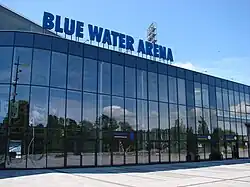 | |
| Former names | Esbjerg Idrætspark (and Esbjerg Stadion) (1955–2007) |
|---|---|
| Location | Gl. Vardevej 62 6700 Esbjerg |
| Coordinates | 55°28′55″N 8°26′22″E / 55.481985°N 8.43941°E |
| Owner | Esbjerg Municipality |
| Operator | Sport & Event Park Esbjerg |
| Capacity | 16,942[1] |
| Record attendance | 22,000 (Esbjerg fB vs. KB, 1961) |
| Field size | 105 x 68 m |
| Surface | Grass |
| Construction | |
| Built | 1955 (original site 1929) |
| Opened | 1955 |
| Renovated | 1999, 2004, 2009 |
| Construction cost | 105,000,000 DKK[nb 1] |
| Architect | Friis & Moltke[nb 1] |
| Structural engineer | Grontmij Carl Bro[nb 1] |
| General contractor | Davidsen Partnere[nb 1] |
| Tenants | |
| Esbjerg fB (Danish Superliga) (1955–present) European Youth Olympic Festival (1999) | |
The Esbjerg Stadium (Danish: Esbjerg Stadion), known as the Blue Water Arena for sponsorship reasons, is a football stadium located within Esbjerg Idrætspark in Esbjerg, Denmark. It is the home ground of Esbjerg fB and has a capacity of 16,942, of which 11,451 is seated. It is currently the second-biggest stadium in Jutland, and the fourth-biggest in Denmark.
History
The Esbjerg Idrætspark was founded in 1926 and the football pitch, with a running track and area for shot put, high jump, pole vault and long jump, opened on 22 September 1929. In 1948, the adjacent Esbjerg Atletikstadion was constructed and opened.[2] During 1951, the reconstruction of the football stadium began but the municipality ran out of funds and the project stopped. In 1955, a new grandstand was built and the new stadium was inaugurated.[2]
In 1999, the stadium was venue of the football tournament at the European Youth Olympic Festival.
On account of the 2008 UEFA qualifier fan attack resulting in the forbidding of play of UEFA qualifier matches for Denmark within 250 km of Copenhagen, the Esbjerg Stadium was mentioned as the only possible venue within Denmark in which Denmark UEFA qualifier home games can be held as it is the biggest stadium in the country more than 250 km from Copenhagen. UEFA later changed the verdict, and on July 9, 2007 the Danish Football Association announced that the games against Spain and Liechtenstein would be played in Århus and the games against Latvia and Iceland would be played in Copenhagen.
National games
Esbjerg Stadium has twice been used as home ground for the Danish national team. Further it has been venue of several youth national matches:[3]
Footnotes
See also
References
- ↑ "EfB - Esbjerg forenede Boldklubber - Blue Water Arena". Archived from the original on 2014-06-05. Retrieved 2014-06-25.
- 1 2 "Sports Park, Gl. Vardevej History". Sport and Event Park Esbjerg. Retrieved 10 December 2023.
- ↑ "Landsholdsdatabasen" (in Danish). Danish Football Association. Retrieved 2010-03-01.
External links
- (in Danish) Blue Water Arena at Sport & Event Park Esbjerg
- (in Danish) Renovation blog